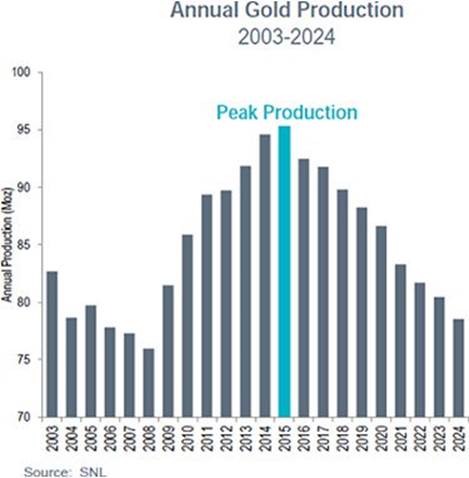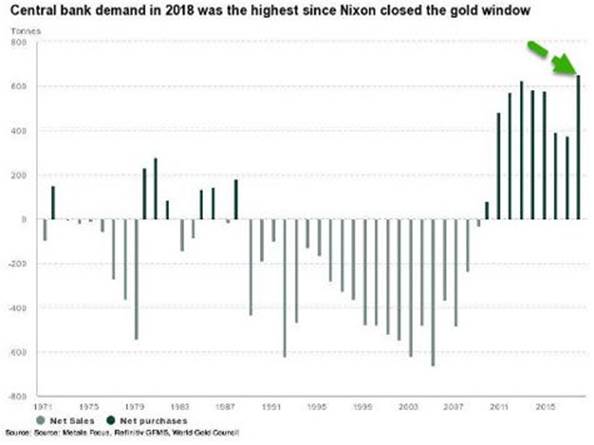So Why Should You Own Gold? / Commodities / Gold & Silver 2019
 Maybe you have some gold (and silver) butnot enough. Maybe you haven't added to your stash for quite awhile, and youkinda' forgot why you bought it in the first place.
Maybe you have some gold (and silver) butnot enough. Maybe you haven't added to your stash for quite awhile, and youkinda' forgot why you bought it in the first place.
Or perhaps you don't own any preciousmetals at all!
If one of these circumstances fits you,then it's time to refresh your memory on the multiple reasons why you should owngold, assess your risk profile and unique financial circumstances... then act!
The oft-stated Gresham's Law tells usthat when a government dictates the exchange rate between different types ofmoney, the "good," or undervalued method of exchange gets chased outby the "bad," or overvalued version.
Thus the "bad" money stays incirculation and, as debasement (inflation) picks up, is quickly spent.
Unbeknownst to most – for now – U.S.inflation (greatly understated by "official" statistics) isincreasing across the board. It doesn't need to hit double digits in order tomove the dial on gold and silver prices. Invariably, the "smartmoney" sniffs out the potential well beforehand – which is what it's beendoing for the last 9 months!
The "good" money in the U.S. isin reference to gold after FDR's infamous 1933 edict banning circulation… andlater, the removal of silver from our coinage starting in 1965.
Today, a pre-1965 quarter at$16/ounce silver is worth about $2.75. Why would anyone exchange it for an 8%copper/92% nickel slug? As for a gold coin, don't even bother doing the math!
In Venezuela, according to the IMF,inflation will rocket along this year at 10 million percent! How long do youthink the ironically-named Bolivar Fuerte ("strongbolivar") stays in someone's pocket, bank account, backpack... or largecardboard box?
You probably recall the reasons for owning gold. Here’s atimely review...
It's durable. Spanishgold bars and coins have been recovered from shipwrecks submerged forcenturies... no worse for the wear!
It's portable. A 25 (troy) ounce tube weighs less than two (avoirdupois)pounds and is worth around $33,000 today.
It's divisible into small portions. 1/10th of an ounce is thesize of a thin dime, but you can buy/store it by the gram - or in blocks ofgrams.
It's difficult to counterfeit. Just about any quality coin shop can spot a "weightproblem" in relation to the expected size of a bullion coin or bar that acrook – or a naive buyer – might bring in for fiat trade.
It stores easily. Significant dollar amounts can be squirreled away justabout anywhere.
Gold available for purchase is in finitesupply. At a fairly consistent production rate of around 2%/year(and falling), gold is unlikely to experience a "production spike"like a base metal might.
It can serve as collateral forloan agreements, and as financial insurance.
Gold (and silver) make great gifts. My daughter still has the 1 troy ounceKrugerrand she received as a high schoolgraduation present. The cost: $275. Her brother has a tube of 25 AmericanSilver Eagles purchased for $7.50 apiece.
It's costly to mine. Theindustry gauging standard of All-In-Sustaining-Costs (AISC) for even the mostefficient miners is still about 80-90% per ounce of what they're paid from thesale of production. What's more, miners have a wasting asset that – unless thedeposit can be replaced with additional ore – diminishes the value of theirproject with every ounce they sell.
Anonymous Storage. Gold can be stored by you personally, or in vaultingjurisdictions that don't have reporting requirements. In recent years, thegovernment narrative has been advanced that equates privacy with illegality.
The reality is that a certain level ofprivacy is the cornerstone of a free people. As governments around the globeseek to limit the size – and scope – of cash (fiat) transactions, privacy bydefinition becomes less and less possible.
When there's a crisis, individuals andcentral banks accumulate gold. There are manystraws in the wind right now. Most of us have an uneasy feeling that"something's just not right" – but we can't pin it down.
What's interesting is that the world'scentral banks laid in more gold last year than they've done for the past 50years! Shouldn't we be paying attention too?
Gold is money. It's more liquid than real estate, or just about any otherpossession you own.
In the early 1980's, the school in asmall Alaskan town faced having to close down due to lack of funds. Into theboard meeting came an old Sourdough, offering the gift of a wooden box... fullof gold bullion coins. Two days later that stash had been turned into cold, hard cash– enabling the school to operate in the community's interest for the nextthirty years.
David Morgan is known in certaincircles as "the Silver Guru," but his prescient calls at major marketturns over the years have demonstrated that he has an equal understanding aboutgold, copper, uranium, and the energy markets as well. Recently he stated,
Extreme price movement in gold isexperienced when demand is increasing rapidly, while at the same time, thosewho currently possess gold wish to hold on to what they have – or buy more.
This is a rare phenomenawhere the confidence in the currency system breaks down and a "run togold" begins. Almost overnight the belief that a "dollar" hasvalue is recognized for what all fiat is and always has been – a giantconfidence (read con) game played on a trusting pubic by the banking elite.Once enough people act on the truth (not just recognizing – but acting on thatunderstanding), the system's days are numbered.
Which leads to Jim Rickards' (and my)pithy conclusion:
"If the price of gold movessideways or down a little, you won’t make or lose much money. That’s fine; it’slike another form of cash. If gold soars, you’ll make a dollar-denominatedfortune regardless of your particular entry price. That’s fine too.
The danger is not havingthe gold in the first place and not being able to acquire it when the demandand price are soaring and there’s no supply. At that point, you’re just aspectator. The gold train has passed you by."
David Smith isSenior Analyst for TheMorganReport.com and a regular contributor to MoneyMetals.com aswell as the LODE Cryptographic Silver Monetary System Project. He hasinvestigated precious metals’ mines and exploration sites in Argentina, Chile,Peru, Mexico, Bolivia, China, Canada and the U.S. He shares resource sectorobservations withr eaders, the media and North American investment conferenceattendees.
© 2005-2019 http://www.MarketOracle.co.uk - The Market Oracle is a FREE Daily Financial Markets Analysis & Forecasting online publication.
